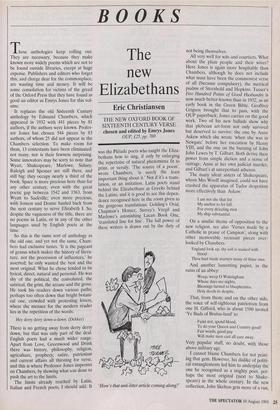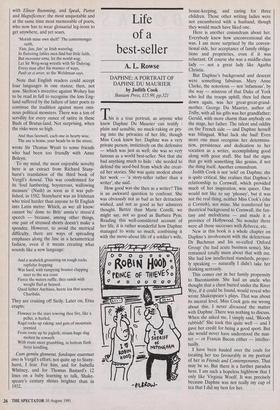BOOKS
The new Elizabethans
Eric Christiansen
THE NEW OXFORD BOOK OF SIXTEENTH CENTURY VERSE chosen and edited by Emrys Jones OUP, £25, pp. 769 Th_ hese anthologies keep rolling out. They are necessary, because they make known more widely poems which are not to be found outside libraries, except at huge expense. Publishers and editors who forget this, and charge dear for the commonplace, are wasting time and money. It will be some consolation for victims of the greed of the Oxford Press that they have found as good an editor as Emrys Jones for this vol- ume.
It replaces the old Sixteenth Century anthology by Edmund Chambers, which appeared in 1932 with 441 pieces by 81 authors, if the authors were known. Profes- sor Jones has chosen 544 pieces by 83 authors, of whom 25 did not appear in the Chambers selection. To make room for them, 13 contestants have been eliminated: not many, nor is their fewness surprising. Some innovators may be sorry to note that Wyatt, Shakespeare, Marlowe, Sidney, Raleigh and Spenser are still there, and still big: they occupy nearly a third of the book. Space is more precious here than for any other century, even with the great poetic gap between 1542 and 1563, from Wyatt to Sackville; even more precious, with Jonson and Donne hauled back from the next century to serve Elizabeth I. So, despite the vagueness of the title, there are no poems in Latin, or in any of the other languages used by English poets at the time.
So this is the same sort of anthology as the old one, and yet not the same. Cham- bers had exclusive tastes. 'It is the pageant of genius which makes the history of litera- ture, not the procession of influences,' he asserted; he only wanted the best and the most original. What he chose tended to be lyrical, direct, natural and personal. He was shy of the political, the convoluted, the satirical, the grim, the arcane and the gross. He took his readers down various paths; perhaps too often down that bright botani- cal one, crowded with protesting lovers, where the menace for the modern reader lies in the repetition of the words:
Hey derry deny down-a-down. (Dekker)
There is no getting away from deny derry down, but that was only part of the deal. English poets had a much wider range. Apart from Love, Greenwood and Drink there was history, philosophy, religion, agriculture, prophecy, satire, patriotism and current affairs all thirsting for verse, and this is where Professor Jones improves on Chambers, by showing what was done to push the art to the limits. The limits already reached by Latin, Italian and French poets, I should add. It was the Pleiade poets who taught the Eliza- bethans how to sing, if only by enlarging the repertoire of natural phenomena fit to print, or versify. 'The source of a poem', wrote Chambers, 'is surely the least important thing about it.' Not if it's a trans- lation, or an imitation. Latin poets stand behind the Elizabethans as Greeks behind the Latins; and it is good to see this depen- dence recognised here in the room given to the gorgeous translations: Golding's Ovid, Chapman's Homer, Surrey's Vergil and Marlowe's astonishing Lucan Book One, `translated line for line'. The full power of these writers is drawn out by the duty of `How's that anti-litter article coming along?' not being themselves.
All very well for wits and courtiers. What about the plain people and their wives? Here Jones is again more hospitable than Chambers, although he does not include what must have been the commonest verse of all (because compulsory), the metrical psalms of Sternhold and Hopkins. Tusser's Five Hundred Points of Good Husbandry is now much better-known than in 1932, as an early book in the Green Bible. Geoffrey Grigson brought that to pass, with the OUP paperback; Jones carries on the good work. Two of his new ballads show why that plebeian art-form not only survived but deserved to survive: the one by Anne Askew which she wrote 'when she was in Newgate' before her execution by Henry VIII, and the one on the burning of John John Lewes by T. Gilbart. Both derive their power from simple diction and a sense of outrage; Anne at her own judicial murder, and Gilbart's at unrepentant atheism.
The many silent sisters of Shakespeare, whom Mrs Woolf imagined, could not have crushed the apparatus of Tudor despotism more effectively than Askew:
1 am not she that list My anchor to let fall. For every drizzling mist My ship substantial.
On a similar theme of opposition to the new religion, see also 'Verses made by a Catholic in praise of Campion', along with other memorable recusant pieces over- looked by Chambers.
England look up, thy soil is stained with blood Thou hast made martyrs many of thine own.
And another lamenting papist, in the ruins of an abbey:
Weep, weep 0 Walsingham Whose days are nights, Blessings turned to blasphemies, Holy deeds to despite.
That, from them; and on the other side, the voice of self-righteous patriotism from one H. Gifford, who in about 1580 invited `Ye Buds of Brutus-land' to
Faint not, spend blood, To do your Queen and Country good! Fair words, good pay Will make men cast all care away.
Very popular stuff, no doubt, with those above military age.
I cannot blame Chambers for not print- ing that gem. However, his dislike of politi- cal entanglements led him to underplay the one he recognised as a mighty poet, per- haps the most original (next to Shake- speare) in the whole century. In the new collection, John Skelton gets more of a run,
with Elinor Rumming, and Speak, Parrot and Magnificence: the most unquotable and at the same time most memorable of poets, who now has to wear glossarial leg-irons to get anywhere, and yet soars.
`Morish mine own shelf!' The costermonger saith,
`Fate, fate, fate' ye Irish waterlag; In flattering fables men find but little faith, But moveatur terra, let the world wag; Let Sir Wrig-wrag wrestle with Sir Dalyrag; Every man after his manner of ways, Panb yn ei arver, so the Welshman says.
Note that English readers could accept four languages in one stanza; then, not now. Skelton's invective against Wolsey has to be read in full to recognise the loss Eng- land suffered by the failure of later poets to continue the tradition against more omi- nous political monsters. There was a ton of servility for every ounce of satire in these Buds of Brutus-land. Not surprising, when the risks were so high.
And thus farewell, each one in hearty wise. The axe is home, your heads be in the street,
wrote Sir Thomas Wyatt to some friends who had been too friendly with Anne Boleyn.
To my mind, the most enjoyable novelty here is an extract from Richard Stany- hurst's translation of the third book of Vergil's Aeneid. This was condemned for its 'foul lumbering, boysterous, wallowing measure' (Nash) as soon as it was pub- lished, in 1582. Stanyhurst was an Irishman who tried harder than anyone to fit English into Latin metre: Which, as we/ all know/ cannot be/ done to Brit/ annia's/ stress'd speech — because, among other things, one pair of stressed shorts doesn't make a spondee. However, to avoid the metrical difficulty, there are ways of spreading emphases along the line in a hexametrical fashion, even if it means creating what sounds like a new language:
And a seabelch grounting on rough rocks rapfulye frapping Was hard; with rampying bounce clapping neer to the sea coast Fierce the waters ruffle, thee sands with wroght flud ar hoysed.
Quod father Anchises, heere loa that scurvye Charibdis.
They are cruising off Sicily. Later on, Etna erupts:
Flownce to the stars towring thee fire, like a pellet, is hurled, Ragd rocks up raking: and guts of mountain yrented From roote up he jogleth; stoans huge slag molten he rowseth With route snort grumbling, in bottom flash furye kendling.
Cum gemitu glomerat, fundoque exaestuat imo is Vergil's effort; not quite up to Stany- hurst, I fear. For him, and for Isabella Whitney, and for Thomas Bastard's 12 lines on a baby learning to talk, Shake- speare's century shines brighter than in 1932.



















































 Previous page
Previous page